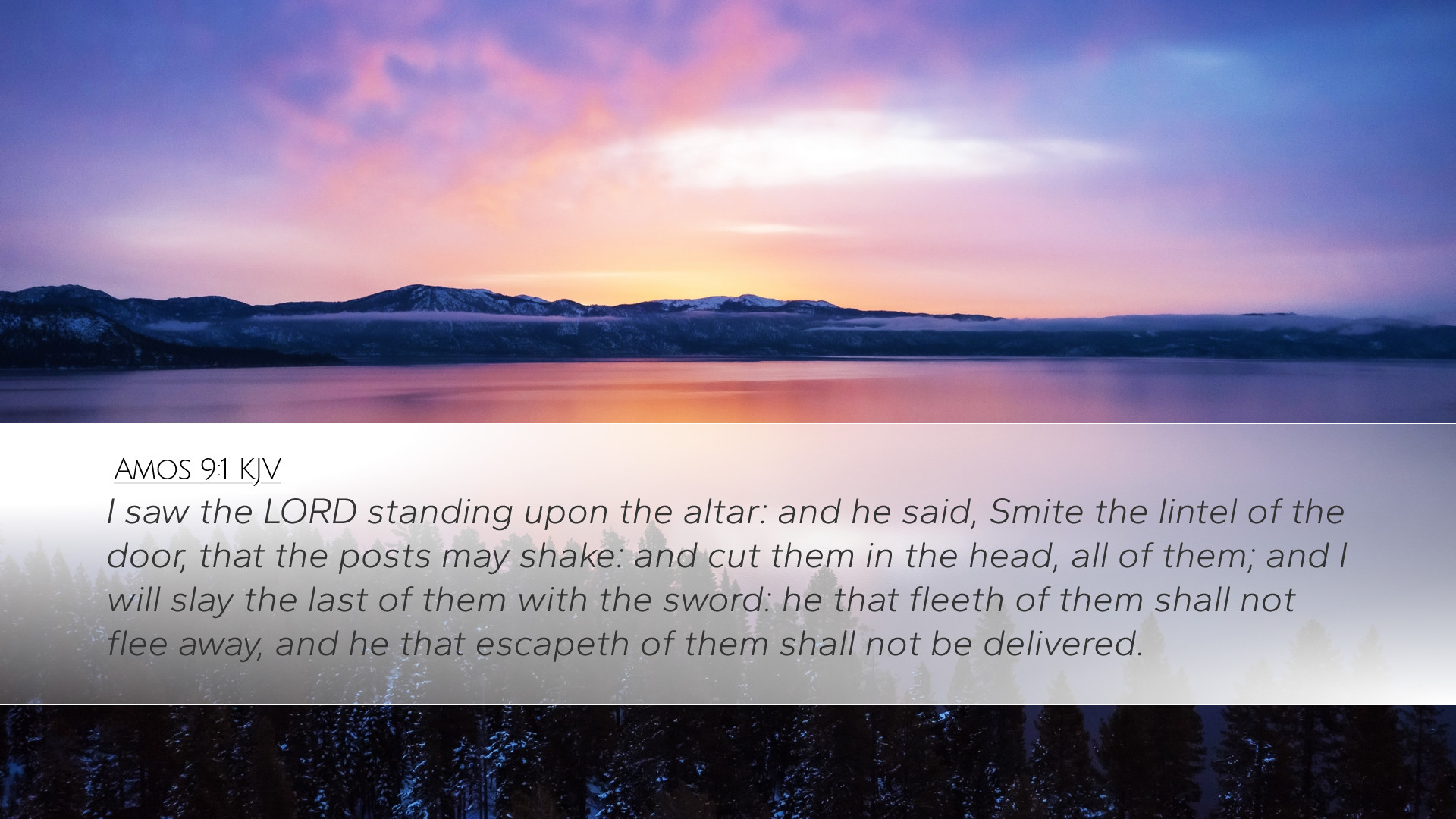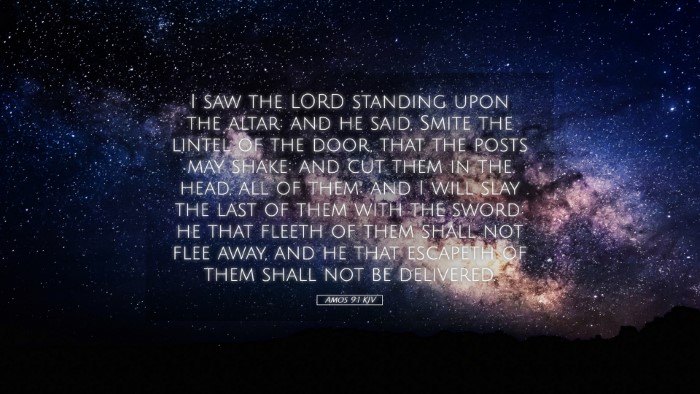Old Testament
Genesis Exodus Leviticus Numbers Deuteronomy Joshua Judges Ruth 1 Samuel 2 Samuel 1 Kings 2 Kings 1 Chronicles 2 Chronicles Ezra Nehemiah Esther Job Psalms Proverbs Ecclesiastes Song of Solomon Isaiah Jeremiah Lamentations Ezekiel Daniel Hosea Joel Amos Obadiah Jonah Micah Nahum Habakkuk Zephaniah Haggai Zechariah MalachiAmos 9:1
Amos 9:1 KJV
I saw the LORD standing upon the altar: and he said, Smite the lintel of the door, that the posts may shake: and cut them in the head, all of them; and I will slay the last of them with the sword: he that fleeth of them shall not flee away, and he that escapeth of them shall not be delivered.
Amos 9:1 Bible Commentary
Commentary on Amos 9:1
Amos 9:1: “I saw the Lord standing by the altar: and he said, Smite the lintel of the door, that the posts may shake: and cut them in the head, all of them; and I will slay the last of them with the sword: he that fleeth of them shall not flee away, and he that escapeth of them shall not be delivered.”
Introduction
The book of Amos, a prophetic text, calls out the injustices and spiritual failures of Israel. Chapter 9 marks the culmination of Amos's warnings, resulting in a vision of divine judgment against the nation. In this commentary, we will explore the implications of Amos 9:1 through insights drawn from public domain commentaries by Matthew Henry, Albert Barnes, and Adam Clarke.
Context and Background
The backdrop of Amos’s prophecy is a time of relative prosperity in Israel, overshadowed by moral decay and blatant injustices. Amos, a shepherd and fig farmer called by God, challenges the religious and social status quo. Chapter 9 shifts from judgment to the hope of restoration, but this specific verse predominantly deals with divine retribution.
Analysis of the Verse
- The Vision of the Lord: Amos begins with a powerful image of the Lord standing beside the altar. This indicates God's active presence and authority over worship and judgment. Matthew Henry notes that God’s standing beside the altar signifies His readiness to execute judgment upon those who defile holy places with their sinful practices.
- Command to Smite the Lintel: The instruction to smite the lintel, resulting in the shaking of the posts, suggests a violent intervention that will disrupt the status quo. Albert Barnes indicates that the lintel represents security, stability, and the place of worship. The act symbolizes God's impending destruction of false security among the people.
- Divine Judgment: The phrase "cut them in the head" portrays a decisive and fatal blow to the people in their arrogance. Adam Clarke interprets this as a direct strike against the leaders and influential figures who lead the people astray. This judgment is comprehensive, ensuring that none can escape God's reckoning.
- Futility of Escape: The concluding warning that “he that fleeth of them shall not flee away” illustrates the inescapability of God's judgment. This highlights that no matter the efforts to evade the consequences, God's decree will prevail. Henry emphasizes that the divine justice of God cannot be thwarted, and its execution is assured.
Theological Implications
Amos 9:1 serves as a stark reminder of the seriousness of sin and the sovereign authority of God over Israel and all nations. The theological themes presented are relevant for today's readers, especially for pastors and scholars:
- God's Holiness: This passage conveys the intrinsic holiness of God, which cannot tolerate injustice and transgression. Pastors can use this to remind congregations of the importance of holiness in worship and everyday life.
- Judgment and Mercy: While judgment is the focal point here, the larger context of Amos provides a dichotomy of hope and repentance. God’s desire for His people is not destruction but restoration; thus, preachers can emphasize God’s love and willingness to forgive when genuine repentance occurs.
- The Inescapability of Divine Justice: This verse speaks to the futility of human attempts to evade divine judgment. This can be a crucial teaching point in discourses on accountability and the necessity of living righteously before God.
Practical Applications
In considering the implications of Amos 9:1, we can derive several practical applications for both personal and communal faith practice:
- Self-Examination: As believers, it is vital to continually examine our own lives for areas of sin or complacency that could incur God's displeasure. This verse pushes us to pursue holiness actively.
- Church Accountability: Leadership within the church must lead with integrity and accountability, ensuring that they do not stray from the path of righteousness, thus avoiding the fate described in this passage.
- Emphasis on True Worship: Worshiping God in spirit and truth must be a priority, ensuring it aligns with His holiness and values. This calls for a continuous commitment to genuine worship and service.
Conclusion
Amos 9:1 profoundly captures the gravity of God's judgment against unfaithfulness, emphasizing His unyielding nature and the certainty of divine retribution. Through the insights of Matthew Henry, Albert Barnes, and Adam Clarke, we recognize the multifaceted implications of this verse for personal faith and ecclesiastical responsibility. Overall, the text serves as a clarion call for repentance, validation of God’s holiness, and an encouragement to live in accordance with His will.
References
- Henry, Matthew. Matthew Henry's Commentary on the Whole Bible
- Barnes, Albert. Notes on the Old Testament: Amos
- Clarke, Adam. Adam Clarke's Commentary on the Bible


